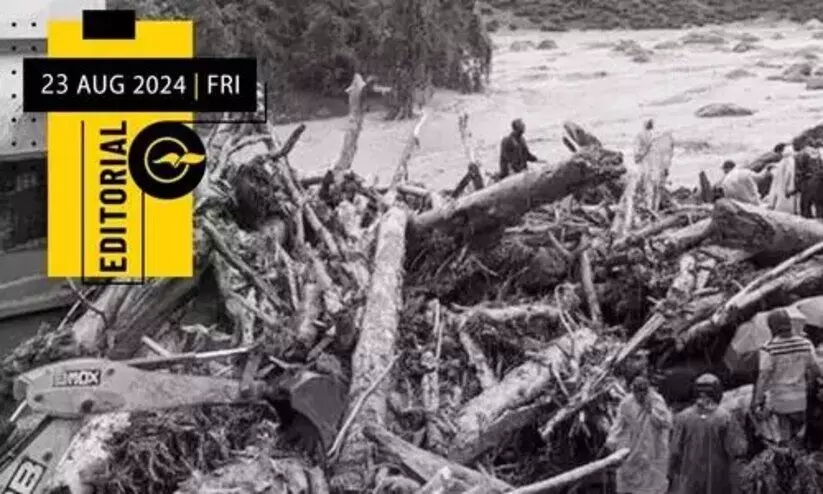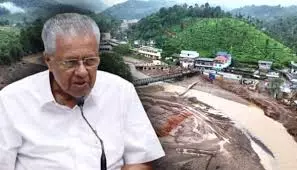
Homework for rehabilitation
text_fieldsIt has been three weeks since Kerala woke to the Mundakkai-Chooralmala landslide tragedy that hit Wayanad. The disaster area is only slowly getting out of the stagnation of the house of death. Those who lost their homes and have been living in relief camps are shifting to rented houses and homes of relatives. What needs to be done is to provide full support to those who have lost everything they owned from the face of the earth, free them from the sense of alienation caused by the death of their loved ones and the loss of valuable savings, to rebuild their lives with dignity. It is encouraging that well-meaning individuals, philanthropic organizations and industrialists have volunteered to fulfil this duty. The extent of the loss caused by the Wayanad disaster is only being ascertained which is critical for flawless rehabilitation and reconstruction.
The preliminary study report prepared by the People's Foundation, an NGO, under the leadership of experts in the field of disaster management and bio disciplines was released the other day by conducting geo-mapping through satellite survey and directly talking to the affected people. Details such as the number of dead, houses that are completely destroyed in the disaster area, uninhabitable houses and details of the people who lived there are thus available in the public domain. It will be useful for government and non-governmental organizations to carry out relief operations, researchers and students for study purposes and for the general public to gauge the severity of the disaster. Businesses have also suffered heavy losses in this calamity. 78 businesses were destroyed. Kerala Vyapari Vyavasayi Ekopana Samithi (KVVES) estimates that there has been a loss of around 25 crores. The Indian Union Muslim League announced yesterday that it will provide 15,000 rupees to 691 families and 50,000 rupees to 40 people who have completely lost their businesses. They are prepared to build houses for a hundred families and provide job opportunities for candidates from the region. Kerala Nadvathul Mujahideen has decided to build houses for 50 families and set up 50 drinking water and self-employment projects. Jamaat-e-Islami also announced a first phase rehabilitation scheme of ten crore rupees, including providing higher education facilities to the affected people. Kerala Catholic Bishops Mission (KCBC) has announced that they will build 100 houses and give Rs 9,500 each to the disaster-affected families. Malankara Orthodox Syrian Church head Baselios Marthoma Mathews III has assured that they will build 50 houses. All these included, ten and a half acres of property and over a thousand houses have already been offered. What the government needs to do is to facilitate with transparency the effective utilisation of resources of people and organisations who have come forward to help the effort.
Chief Minister Pinarayi Vijayan released preliminary information about the plans envisaged for the affected. It has been announced that a state-of-the-art township with all facilities will be prepared. A team of experts led by geologist John Mathai has identified suitable places for the rehabilitation. Now it is the responsibility of the government to expedite the follow-up. Sarada G Muraleedharan, the new Chief Secretary, has also informed that the first task is to prepare the Wayanad package. It can be quite a daunting endeavour. Before embarking on Mundakkai-Chooralmala rehabilitation, it would be beneficial to review the announcements and rehabilitation activities made during similar disasters in the past. 'Madhyamam' reporters had travelled through Amboori, Kavalappara, Poouthumala and Pettimudi, which were hit by landslides in recent years, and inquired how the survivors are living now. It did take a court intervention to enable the government-assured rehabilitation of Kavalappara. Some bankers have been threatening the farmers who have lost their agricultural land in the calamity of foreclosure on the grounds of failure to repay their agricultural loans. Even five years after the Pettimudi tragedy, the central assistance announced for them has not been made available. Many did not even get houses. As for the houses that were built, they are not good for many of the affected people as they are kilometres away from their place of work. Another problem is that the houses constructed under the plan made by the government for Poothumala victims are leaking. The flaw in the plan was pointed out during construction, but those concerned did not heed it and the survivors are suffering because of it. These remarks are not intended to blame any one but to prevent recurrence of such mistakes. The goal of the rehabilitation initiatives should be to fulfil our obligations to our brothers and sisters, not to build a mere system of replacement for those who have lost everything. The hardships of the victims of Kavalappara, Poothumala and Pettimudi cannot be dismissed as outdated. This is an opportunity to make amends. The government and voluntary organizations should be careful to correct the mistakes made in the rehabilitation of the victims of the past and to avoid such lapses in future projects including Mundakkai and Chooralmala. Only then will our assurance 'We are with you' be true.


























